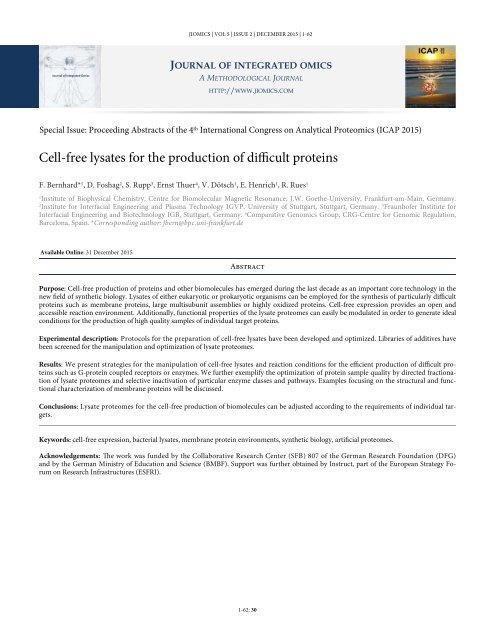JIOMICS
JIOMICS Internacional
JIOMICS Internacional
Create successful ePaper yourself
Turn your PDF publications into a flip-book with our unique Google optimized e-Paper software.
<strong>JIOMICS</strong> | VOL 5 | ISSUE 2 | DECEMBER 2015 | 1-62<br />
JOURNAL OF INTEGRATED OMICS<br />
Journal of Integrated Omics<br />
A METHODOLOGICAL JOURNAL<br />
HTTP://WWW.<strong>JIOMICS</strong>.COM<br />
Special Issue: Proceeding Abstracts of the 4 th International Congress on Analytical Proteomics (ICAP 2015)<br />
Cell-free lysates for the production of difficult proteins<br />
F. Bernhard* 1 , D. Foshag 2 , S. Rupp 3 , Ernst Thuer 4 , V. Dötsch 1 , E. Henrich 1 , R. Rues 1<br />
1<br />
Institute of Biophysical Chemistry, Centre for Biomolecular Magnetic Resonance, J.W. Goethe-University, Frankfurt-am-Main, Germany.<br />
2<br />
Institute for Interfacial Engineering and Plasma Technology IGVP, University of Stuttgart, Stuttgart, Germany. 3 Fraunhofer Institute for<br />
Interfacial Engineering and Biotechnology IGB, Stuttgart, Germany. 4 Comparative Genomics Group, CRG-Centre for Genomic Regulation,<br />
Barcelona, Spain. *Corresponding author: fbern@bpc.uni-frankfurt.de<br />
Available Online: 31 December 2015<br />
Abstract<br />
Purpose: Cell-free production of proteins and other biomolecules has emerged during the last decade as an important core technology in the<br />
new field of synthetic biology. Lysates of either eukaryotic or prokaryotic organisms can be employed for the synthesis of particularly difficult<br />
proteins such as membrane proteins, large multisubunit assemblies or highly oxidized proteins. Cell-free expression provides an open and<br />
accessible reaction environment. Additionally, functional properties of the lysate proteomes can easily be modulated in order to generate ideal<br />
conditions for the production of high quality samples of individual target proteins.<br />
Experimental description: Protocols for the preparation of cell-free lysates have been developed and optimized. Libraries of additives have<br />
been screened for the manipulation and optimization of lysate proteomes.<br />
Results: We present strategies for the manipulation of cell-free lysates and reaction conditions for the efficient production of difficult proteins<br />
such as G-protein coupled receptors or enzymes. We further exemplify the optimization of protein sample quality by directed fractionation<br />
of lysate proteomes and selective inactivation of particular enzyme classes and pathways. Examples focusing on the structural and functional<br />
characterization of membrane proteins will be discussed.<br />
Conclusions: Lysate proteomes for the cell-free production of biomolecules can be adjusted according to the requirements of individual targets.<br />
Keywords: cell-free expression, bacterial lysates, membrane protein environments, synthetic biology, artificial proteomes.<br />
Acknowledgements: The work was funded by the Collaborative Research Center (SFB) 807 of the German Research Foundation (DFG)<br />
and by the German Ministry of Education and Science (BMBF). Support was further obtained by Instruct, part of the European Strategy Forum<br />
on Research Infrastructures (ESFRI).<br />
1-62: 30


